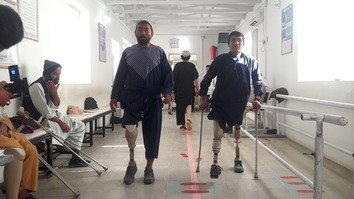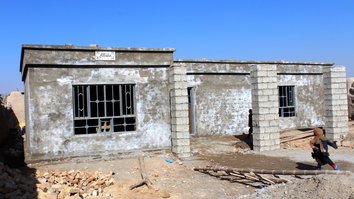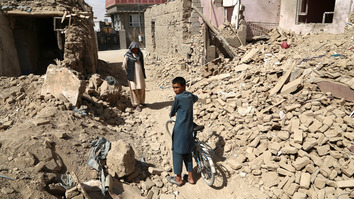LASHKARGAH -- With the Taliban newly cleared from the Bolan, Bashran and Aynak areas of Lashkargah, Helmand Province, residents are eager to return home and go on with their lives.
But now they face yet another obstacle: anti-personnel mines left behind by the Taliban in civilians' houses and mosques and on the streets.
"About six months ago the Taliban seized control of our area, leaving my family no choice except fleeing [to Kabul]," said Sher Mohammad, a resident of Bolan, Lashkargah.
"Now that security forces have defeated the Taliban in this area, we have returned," he told Salaam Times. "Unfortunately, the Taliban planted mines in or on most of our houses and roads. We're unable to move back into our house right now."
His family is staying in a safe place until it can be certain the house is safe, he said.
"Tragedy hit a family that returned to its house in Bolan before we did," said Mohammad.
The Taliban had planted a mine outside that family's house entrance, he said. It blew off the legs of the family's only son, age 16.
Hostage in their own homes
"All these years the Taliban have turned mosques as well as houses of Helmand residents into military trenches," Mirza Hossein Alizadeh, a member of the Helmand Provincial Council, told Salaam Times.
"The Taliban have taken women, children and the elderly hostage in their own homes and used them as human shields," he said, adding that planting mines in houses and near residential areas is "the most recent example of the Taliban's inhumane acts".
"Thousands of civilians have been killed, maimed or disabled by mines that the Taliban planted," he said.
"Planting mines in residential areas and taking shelter in civilians' houses indicate the Taliban's weakness in facing security forces," he said. "It also shows the Taliban's disregard for human rights and for Islamic law."
Enemy of the people
"By planting mines in our houses, on our roads and even in our mosques, the Taliban once again show that they are the enemy of Afghan forces," said Aynak resident Haji Marouf. "They also show their outright hostility toward civilians, especially toward residents of Helmand."
"Many houses in Aynak, all of which the Taliban were using as fortifications, have been destroyed," he told Salaam Times. "If Taliban militants consider themselves Afghans, they should fear God and stop dislocating and harming the people of Helmand."
"If the Taliban aren't our enemy, why do they plant mines in our houses and schools and on our roads and farms?" he asked.
Confirmation
Officials in Helmand Province confirm residents' reports of the widespread mining meant to target civilians.
"Six months ago, the Taliban controlled some of those towns," Helmand governor's spokesman Mohammad Omar Zwak told Salaam Times. "The security forces defeated the Taliban in a month-long operation, forcing them to retreat."
The retreating insurgents, though, left a slew of land mines in Bolan, Bashran and Aynak -- all of which lie within the third district of Lashkargah -- and in Nad-e-Ali District, he said.
"Security forces pushed the Taliban about 8km [out of Lashkargah]," he said, adding that Afghan bomb squads are busy defusing the mines "so that residents can return home as soon as possible".
The Taliban routinely abuse sacred or cherished places, he said.
In April "the Taliban in Nawa District, Helmand Province, turned mosques into fortifications," said Zwak. "They dug trenches and tunnels in mosques to be used as hiding places. Such an act has no place in any religion."
Taliban's actions 'un-Islamic, inhumane'
"The Taliban's mine planting in residential areas is cowardly, un-Islamic and inhumane," said Abdul Jabbar Qahraman, a member of parliament from Helmand and former presidential envoy in charge of security operations in the province.
"Civilians, women and children in particular, have been the main victims of the Taliban's 16 years of fighting and mine planting in Helmand," he told Salaam Times.
"Militants use Helmand's civilians as human shields in order to save their own lives," he said, adding, "The Taliban lack the strength to fight security forces in most areas of Helmand. That's why they resort to seeding houses and roads with land mines."

![A wounded Afghan boy receives medical treatment last October 6 in Lashkargah. Afghan troops expelled the Taliban from parts of Lashkargah, but the Taliban scattered mines throughout the city to target civilians, say officials. [Wakil Kohsar/AFP]](/cnmi_st/images/2017/05/16/7908-000_h656i-585_329.jpg)






